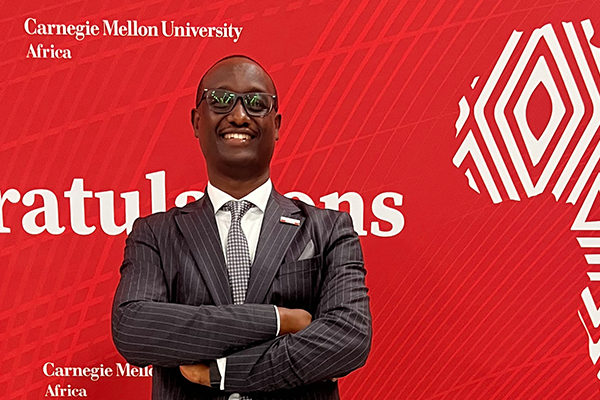Championing engineering at CMU-Africa and beyond
Sarah Maenner
Oct 17, 2024
Kevin Rudahinduka (MSIT '14) launched his career in microfinance banking and has risen to the CEO of Eden Care Medical, a health insurance company based in Kigali, Rwanda. While these fields may seem worlds apart, Rudahinduka sees a clear connection. "I always tell people that I probably started my career on the wrong side," he reflected. "Health is wealth, and ensuring good health is fundamental before managing financial assets."
Between finishing high school and beginning university, Rudahinduka began his career at a microfinance bank, where he discovered he had a talent for processing data. He impressed his employers, who offered him a full-time position there. Instead, he decided to attend the Kigali Institute of Science and Technology (now the School of Science and Technology — University of Rwanda), where he studied information technology.

Source: Kevin Rudahinduka
Following his undergraduate experience and applying that knowledge in industry for seven years, he was determined to deepen his expertise in engineering and innovation, which led him to pursue a master’s degree. Having family ties to Carnegie Mellon University in Pittsburgh, Rudahinduka was already familiar with the institution and its reputation. At the time, CMU-Africa was in its infancy and just getting ready to accept its first class of students, so it was the natural choice: he could receive a world-class education in information technology while remaining with his family.
In those early years, students had a different experience than they do today. With only one program—the Master of Science in Information Technology—students had to strategically choose courses which aligned to their strengths. Reflecting on his time there, he said, "The experience for me was good. I learned a lot."
Since graduating, Rudahinduka leverages his education to enhance customer experience and help people take better care of themselves. He manages information to improve services and transform businesses by optimizing operating efficiency. He "bridges the gap" between engineering and business by translating technical knowledge into business strategy and communicating effectively and solving problems across disciplines.
"I had to move to the other side, on how to use information in business and start talking business language to get work for engineering." he said.
As he advocated for engineering solutions, he learned how to juggle roles such as sales, operations, and finance, creating an expertly versatile portfolio which has led him to the chief executive role. Now, he is the one making the decisions.
Based on these experiences, Rudahinduka advises students to try their best to become familiar with project and people management. Employers who are impressed with their education will want to put them in charge, he says, and they need to be ready for that responsibility.
"I advise students to dedicate at least 50 percent of their focus into mastering engineering while investing the other 50 percent into understanding core business functions."